NEW YORK (CNN/Money) � Whether you're talking income tax, property tax, sales tax or any other tax, your home state (not to mention your hometown) can have a decided effect on your bottom line.
| THE MONEY LISTS
|

|
|
|
|
Just what kind of effect depends on where you live and what kind of income you make.
Some states may have a low income tax, if they collect one at all, but they may charge a high sales tax or impose a tax on investment income. And parts of a state may have high property taxes.
| Money Helps: Last minute tax crunch
|

|
|
|
|
Every year, the Tax Foundation -- a nonpartisan, nonprofit policy research group that advocates, among other things, tax simplification -- takes a look at the state and local tax burdens borne by residents of each state and the District of Columbia.
Using data from the Bureau of Economic Analysis and the National Conference of State Legislatures, the Tax Foundation measures as a percentage of per capita income residents' income, property, sales and other personal taxes levied at the state and local levels. It also factors in the portion of business taxes passed along to state residents through higher prices, lower wages or lower profits.
Filling state coffers
State governments levy at least one of three major taxes to raise revenue: personal income tax, corporate income tax and sales tax. And many tap two or three to keep their coffers filled, as well as a host of other mandatory fees. Local governments, meanwhile, use property tax to raise revenue and may also be permitted to impose an income or sales tax.
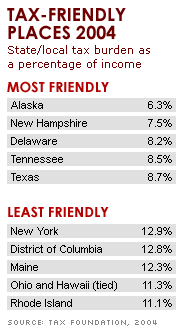
The willingness to tap several tax revenue sources is a distinguishing factor of those places that might be dubbed the least-tax-friendly of 2004 � namely, New York, the District of Columbia, Maine, Ohio, Hawaii, Rhode Island.
"Generally, none have record-setting rates. But they have fairly high rates for all the taxes," said Bill Ahern, spokesman for the Tax Foundation.
New York, a longstanding top 5 player, secured the top spot thanks to a series of increases on income tax, sales tax, and other taxes and fees. As a result, the state is expected to see a net increase in revenue of $2.9 billion in fiscal year 2004, according to a report by the National Association of State Budget Officers (NASBO).
Ohio, meanwhile, has been rising in the ranks over the past few years and earned its No. 3 spot this year in part because the state expects to collect an additional $1.6 billion due to increases in sales tax, corporate income tax, motor fuels tax and various fees, according to the NASBO report.
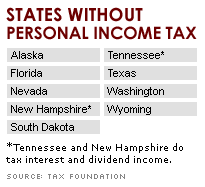
On the flipside, the states that might be dubbed most tax friendly in 2004 � Alaska, New Hampshire, Delaware, Tennessee and Texas, all of whom have been in the top 5 for five years � are notable because they generally only use one or two major tax tools to raise revenue, rather than all three.
Alaska, New Hampshire, Tennessee and Texas, for instance, do not impose a personal income tax. Alaska and New Hampshire also forgo a state sales tax, as does Delaware.
Pack your bags, Bertha. We're movin' ...
So does that mean we should all hightail it to these fine states?
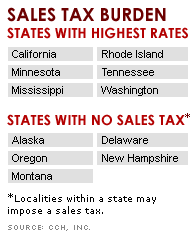
Not so fast. There's no such thing as a tax-free lunch.
Take Tennessee. With a 7 percent sales tax, it (along with Mississippi and Rhode Island) imposes the highest state sales tax rate in the nation � and that doesn't include any additional sales tax a locality may impose.
What's more, the land of country music may not tap your paycheck, but it will tax your interest and dividend income. So if you're a retiree, your source of income will be taxed.
And speaking of retiring, you might want to keep your eye on states that offer retirees income-tax breaks. According to tax information publisher CCH, Inc., at least 16 states do, including Arizona, Colorado, Illinois, Montana and Utah.
But retired or not, where you live in a state can have a big effect on your bottom line because of property taxes.
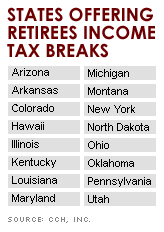
New Hampshire, often categorized as one of the most tax-friendly states, doesn't earn that distinction because of how much residents pay to live in their homes. In fact, according to the Tax Foundation, the state takes in some of the highest levels of property tax revenue per capita of any state in the country.
The argument, of course, is that a state has to raise money somehow. If you're getting a free ride when it comes to taxes on wages and sales (as New Hampshire residents do), then that property tax may not be such a burden after all.
As usual, it all depends.
Look in the mirror
Unless you've really crunched the numbers specific to your life -- not only how much you make and how you make it, but your age, family status and where in a state you want to live -- there's no telling just how tax-friendly (or not) a hometown will be to you.
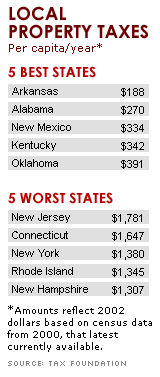
For instance, say a family of four earning $75,000 a year can live in the biggest city of any state in the country. In 2002, their state and local tax burden would have been highest in Bridgeport, Conn. � 17.2 percent of their income would have gone to pay for income, property, sales and auto taxes.
Their burden would have been a fraction of that if they lived in Cheyenne, Wyo. Only 3.5 percent of their income would feed state and local coffers.
That's according to an annual study of tax rates and tax burdens across the country conducted by the District of Columbia's Office of Revenue Analysis. To see how the same family fared in other cities, click here.

|

